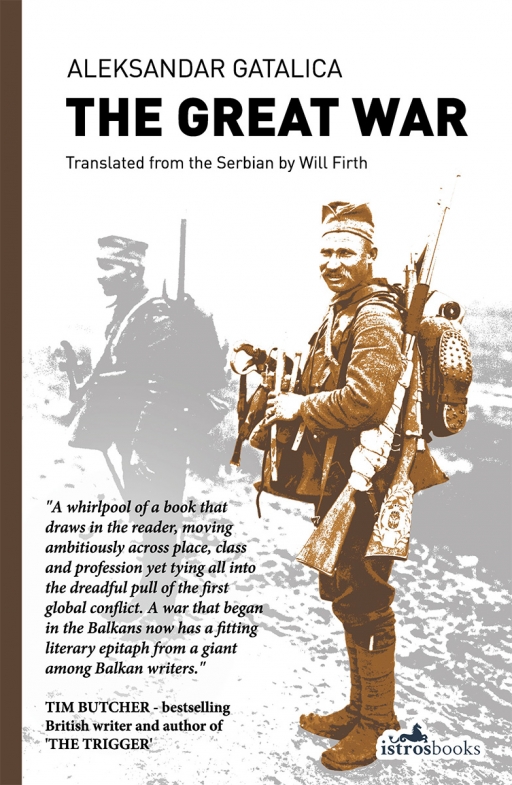Publisher’s Description: ‘The Great War is a novel that comprehensively and passionately narrates a number of stories covering the duration of World War One, starting with the year 1914 – the year that truly marked the beginning of the twentieth century. Following the destinies of over seventy characters, on all warring sides, Gatalica depicts the experiences of winners and losers, generals and opera singers, soldiers and spies; managing to grasp the atmosphere of the entire epoch, not only of these crucial four and a half bloody years, but also in the innocent decades that preceded the war, and the poisoned ones that followed.
The stories themselves are various but equally important: here we find joyful as well as tragic destinies, along with examples of exceptional heroism. Yet ‘The Great War’ never becomes a chronicle, nor a typical historical novel; above all it is a work of art that uses historic events as means to tell many fantastic stories, with unbelievable and unthinkable convolutions. It is commendable in its breadth, its vision and its relevance to modern history.’
Centenary News Review:
Review by: Eleanor Baggley, Centenary News Books Editor
Tim Butcher, author of The Trigger, describes The Great War by Aleksandar Gatalica as a ‘whirlpool of a book’. I couldn’t agree more – ‘whirlpool’ so perfectly captures the essence and energy of this startling book. Translated from the Serbian by Will Firth, The Great War is an award-winning novel which plugs a considerable gap in the modern understanding of World War One by providing the Balkan perspective.
The Great War is a rich and dense novel that often reads like non-fiction due to the breadth of scope and level of detail. Indeed a number of key players in the war, including Manfred von Richthofen (The Red Baron), are given space within the novel, joining a cast of over seventy characters both real and imagined. This vast collection of characters from all over the globe allows Gatalica to create a truly international book which covers a myriad of experiences – from soldiers and spies to artists, journalists and singers.
Just as the range of characters encompasses people from all walks of life, so too does the range of stories vary from seemingly inconsequential everyday happenings to wondrous moments of heroism. It is this breadth and the knowledge that Gatalica felt nothing was too small or too heroic to include, that gives The Great War such energy as it narrates the four and a half years of conflict.
Perhaps one of the most surprising elements of this novel is the blending of genre. On the surface it appears to be a straight forward historical novel, but very early on elements of magical realism are introduced with unexpected results. In a particularly poignant moment, the bodies of Archduke Franz Ferdinand and his wife start to speak, lying side by side on the dissecting table. Only the fictional pathologist Dr Mehmed Graho hears their brief exchange as they predict the great war that will follow their deaths. Though initially the inclusion of magical realism seems incongruous and not a little jarring, its place in the novel soon becomes clear and its power apparent.
Although The Great War is perhaps better suited to readers with a clear interest in the First World War, it is a gripping, confident novel which is both entertaining and surprising. It is fast-paced, full of movement, and compels you to carry on as the narration moves forward, chapter by chapter, through each year of the war.
What do you think about this book or review? Please add a comment below.
